Troika is Amazing British Weirdness
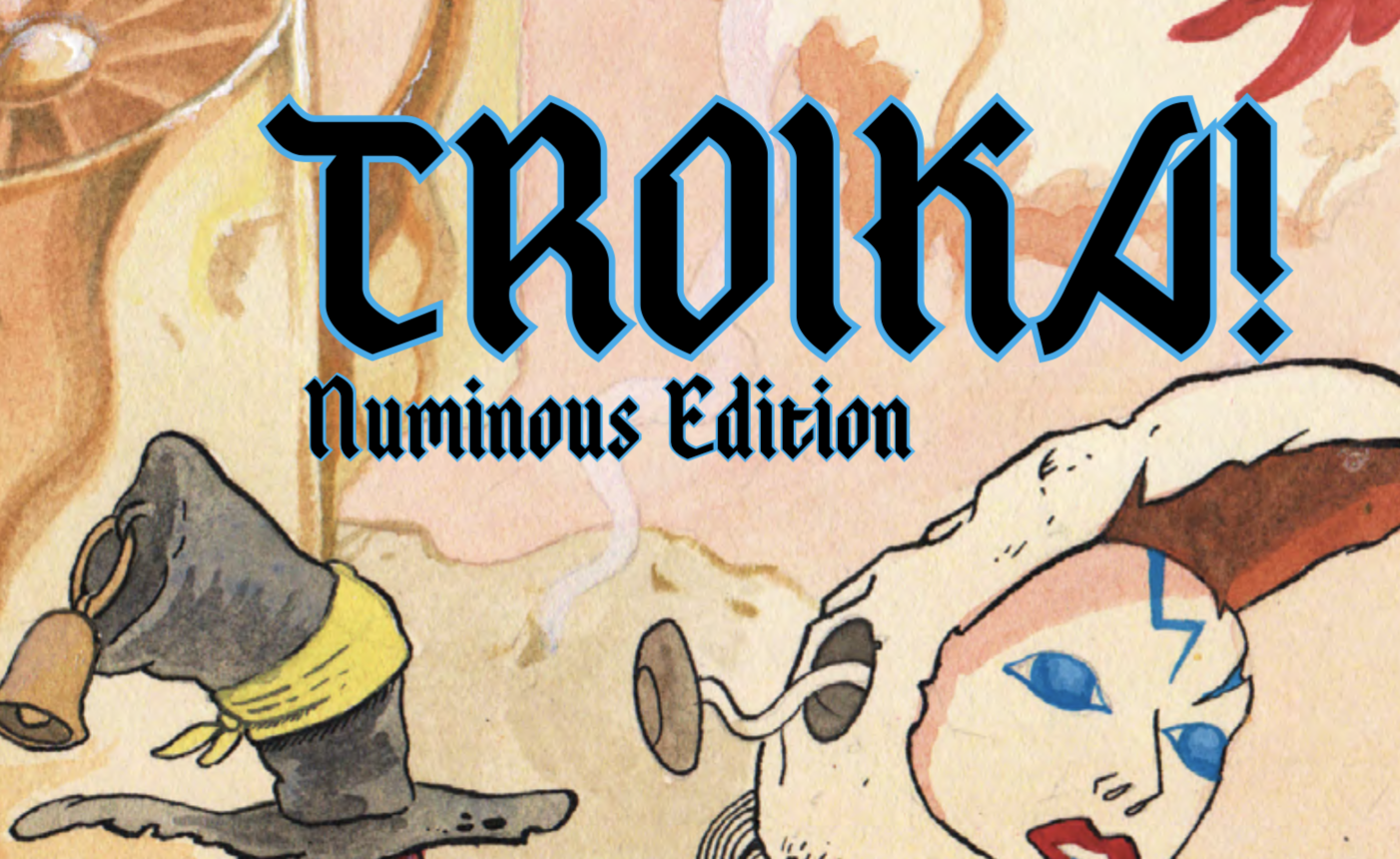
Toika is really good. I’ve written and re-written this review several times, and i eventually settled on just rambling about why I like it. I hope you can follow the meandering nonsense.
So if you’re just looking for a review, Troika is a really interesting and fun RPG that provides a nice contrast to D&Dish games we see so much of. You should buy it. Be sure to get the physical copy if you can, because it’s VERY pretty and well-organized for use at the table.
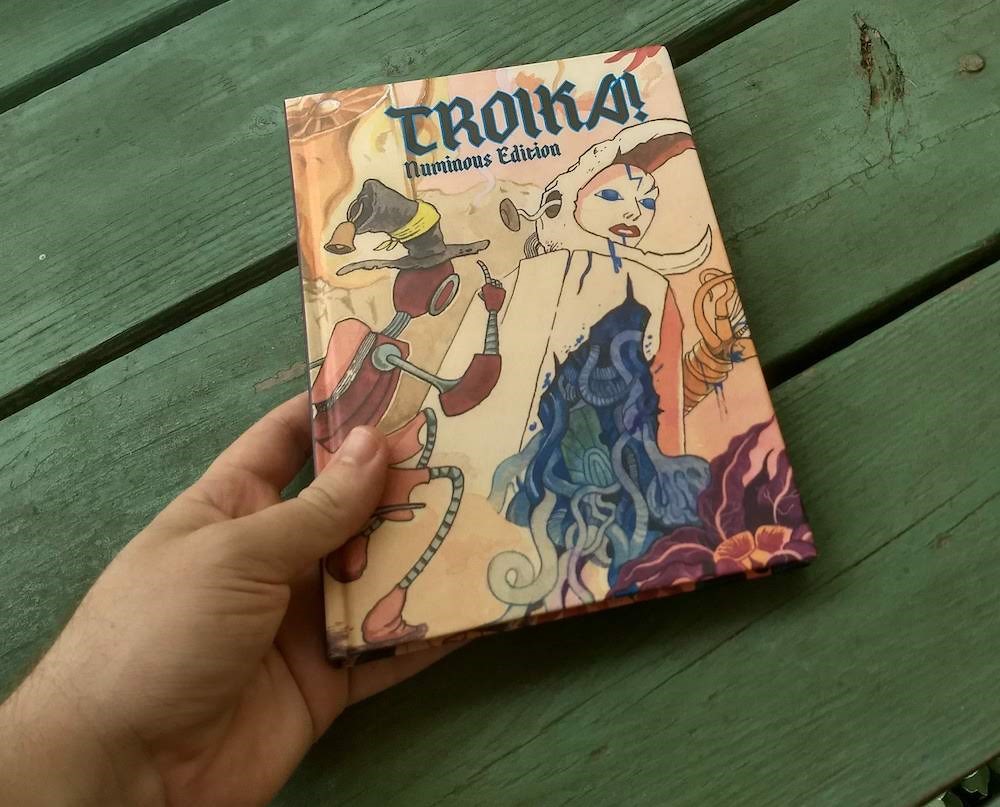
Also I made a handy rules reference for Troika. Oh! and a mobile-friendly character generator. Did I mention that I really like this game?
Also, Also I don’t use the word “weird” as a negative thing. Especially in this review I use it to mean a breath of fresh air, something unique and exciting.
A Quick History Lesson: Permalink
Dungeons and Dragons was published in 1974 and was very popular (perhaps you’ve heard of it). Most of the games that I’ve played are either derived from D&D, or are actively being different from D&D. It’s hard to find any game that hasn’t been affected by Gygax.
However in Britain there was a game called Fighting Fantasy (published in 1982) that really took off. Similar to “Choose Your Own Adventure” books, Fighting Fantasy expanded the concept with a simple RPG system that included character creation, combat, and overcoming obstacles. So it might say something like “Rocks are falling on you. Roll a Luck test. If you succeed, turn to pg 34, if you fail turn to page 97”. The book itself was your GM! What a cool concept.
I don’t actually know how much/little Gygax impacted FF, but it FEELS very different from D&D.
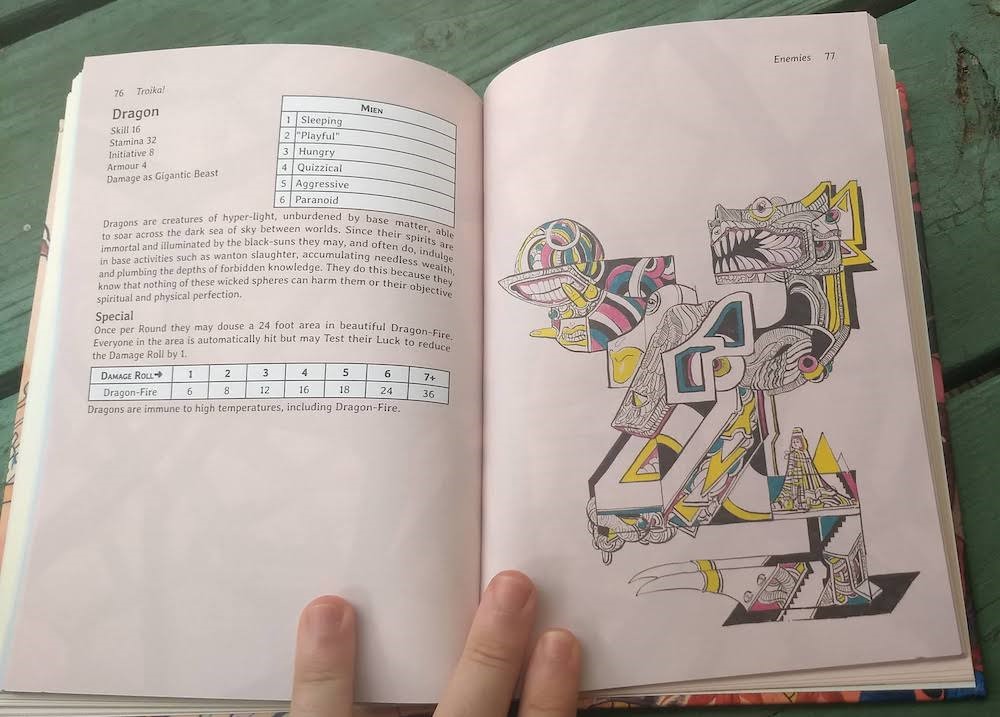
I had never heard of Fighting Fantasy until I started doing research for Troika, and now I wish I had grown up in the UK. I really loved CYOA books as a kid, and the idea that a D&Dish book adventure existed would have blown my 8 year old mind. Heck, it blows my 28 year old mind!
Troika uses FF as the base for its rules, but is a more traditional RPG (requires a GM, multiple players, etc). And to further set itself apart from Fighting Fantasy it injects a huge dose of quirky British fantasy weirdness into the game.
The Importance of “Flavor” Permalink
My first RPG was 4th edition. I played as a Deva Healer. I read the race description, all the rules, the culture, etc. But it didn’t really come to life. Perhaps I should have read more, or invested more energy; but my race felt more like a collection of skats and skills rather than a backstory.
Compare that to Troika, where every character background is overflowing with evocative imagery.
Sorcerer of the College of Friends: “As an integral part of your tutelage in the sub-dimensional academy of the Cordial Wizard God you spent your childhood learning about the fate of pixies, the colour of magic, ritual grammar, and endless other theoretical topics. Now you’re out in the world, discovering that your education hardly accounted for any of the things that you’ve seen.”
Can’t you immediately see how to play that kind of character? Unfamiliar with market haggling, doesn’t know about local politics, perhaps naive or snobby. And that’s one of the more common/familiar backgrounds. Go click the character generator a few times, and you’ll get a good feel for the kind of flavor Troika provides.
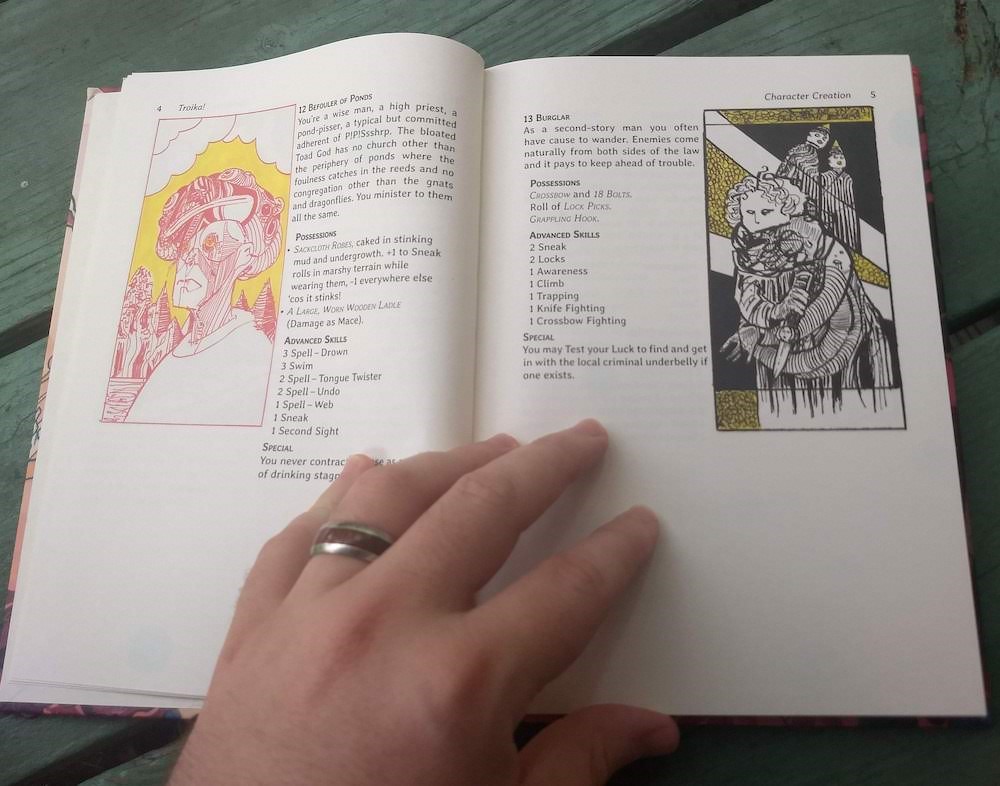
The praise for “flavor” is pretty rare for me; I’m usually more of a mechanics-first kind of gamer. Luckily Troika delivers in that area as well.
I Love Skills Permalink
I dislike intensive, drawn out character creation. I also prefer games that allow for flexible character advancement. Picking from a huge list of 1000 pre-made feats doesn’t count! Kintsugi and Clink were both heavily focused on building your character through play, rather than frontloading everything.
And Troika has a similar way of learning and growing character skills. Instead of increasing stats or health, characters can only learn/improve skills. This is not a limitation, but a freedom! Skills are a flexible system for representing character ability. Even spells are skills! Skills can include stuff like:
- 2 Stealth
- 4 Knife-fighting
- 1 Smooth-talking
- 3 Spell - Life Link
- 1 Fly
So far my players have really enjoyed the potential that skills bring, and they’re eager to learn more.
Weirdness Permalink
And now some random facts that made me fall in love with the game:
Troika includes an adventure with the book. Is it a dungeon crawl? Maybe a monster hunt? No, it’s a strange hotel filled with colorful characters and strange situations.
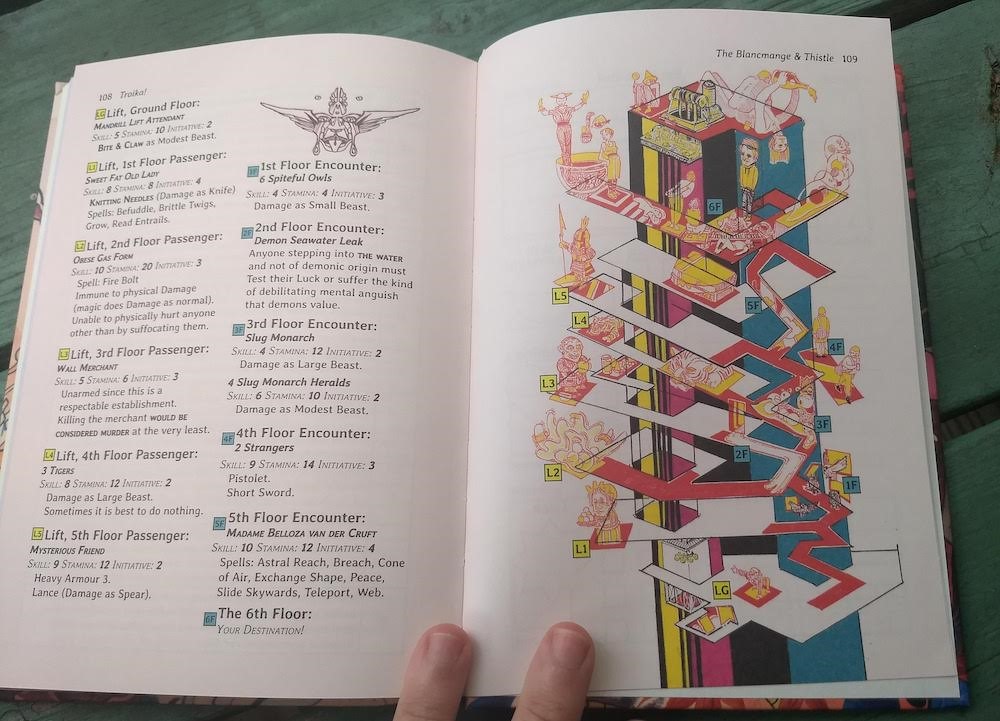
Initiative is handled by placing tokens into a bag and pulling them out to see who goes next. And one of the tokens is the “End Round” token. This makes combat unpredictable and crazy.
Luck is one of your primary stats and is rolled whenever something happens TO you (dodging an explosion, avoiding detection, bandaging a wound, etc). And it goes down the more its used; so characters end the day out of luck and close to danger.
Weapons use a “damage chart”. So a sword might have a chart like the one below:
| 1 | 2 | 3 | 4 | 5 | 6 | 7+ |
| 3 | 3 | 3 | 6 | 6 | 7 | 12 |
Which means you roll a d6, add any modifers to the roll, and consult the chart to see how much damage it actually does. This allows weapons to have VERY different damage spreads and flavor.
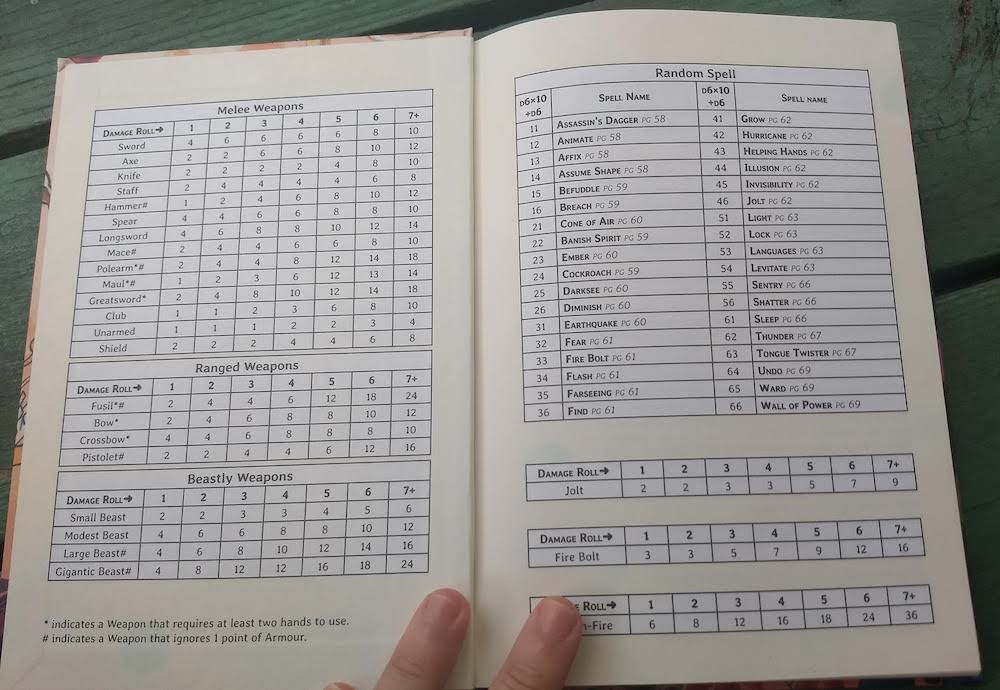
Conclusion Permalink
As I said at the top, it’s really good. And different. And weird. You should buy it.